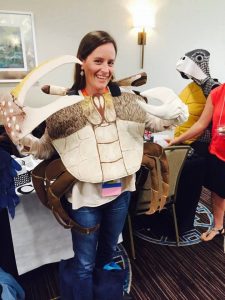Summer 2017 – Education Spotlight
– SEPTEMBER 26, 2017
(From Summer 2017 Newsletter)
GoMRI Outreach Coordinators Lauren Bracken, from the Consortium for Advanced Research on Transport of Hydrocarbon in the Environment (CARTHE), and Jessie Kastler, from the Consortium for Oil Exposure Pathways in Coastal River-Dominated Ecosystems (CONCORDE), attended the 2017 National Marine Educators Association (NMEA) Annual Conference from June 25-29 in Charleston, South Carolina. This year’s theme was Seas of Change: Lowcountry Lessons in Resiliency.
The Dispersion Research on Oil: Physics and Plankton Studies Consortium (DROPPS) recently participated in a summer camp in partnership with the UT Summer Science Program at the University of Texas Marine Science Institute in Port Aransas, Texas. The camp is geared toward elementary and middle school-aged kids. In June, students participated in an all-day activity called Floating Habitats: A Balancing Act. The kids viewed sargassum and the animals that live in it under the microscope, played Jenga as a way to understand the delicate balance of ecosystems and their response to perturbations such as oil spills, and finished the day by releasing the animals they viewed in the microscopes back into the water. View pictures here.
The Environmental Science Journal for Kids recently adapted a publication, funded in part by GoMRI, on how oil spills impact fiddler crabs. The goal of Environmental Science Journal for Kids is to share peer-reviewed journal articles with children and educators. Each paper featured in the journal highlights information from the original article, including the abstract, methods, discussion, and conclusions but modifies it using age-appropriate language. The papers also include an accompanying lesson plan, videos, vocabulary words, and questions for discussion in the classroom. The article, co-authored by Scott Zengel, Steven Pennings, Brian Silliman, Clay Montague, Jennifer Weaver, Donald Deis, Michelle Krasnec, Nicolle Rutherford, and Zachary Nixon, was funded in part through the RFP-II project Accelerating Recovery after the Deepwater Horizon Oil Spill: Response of the Plant-Microbial-Benthic Ecosystem to Mitigation Strategies Promoting Wetland Remediation and Resilience and the RFP-V project Long- Term Impact, Recovery, and Resilience: Wetland Plant-Microbial-Benthic Ecosystem Responses to the Deepwater Horizon Oil Spill and Mitigation Strategies Promoting Sustainability. This research was also highlighted on the GoMRI website, which can be found here.







